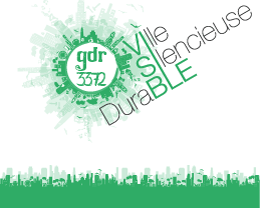Environmental sound quality of our cities is an ongoing issue in our Western societies. More than half of people living in urban areas state that they are still annoyed by the noise produced by transport infrastructure, industry and leisure activities. Legislative action and technological advances have significantly reduced the noise emitted by these sources. Increasing of road, rail and air traffic, their spread over time and space and development of spare-time activities and tourism have partly reduced the effects of technical progress. The implementation in 2007 of the European Directive on Noise from transport infrastructures, requiring the establishment of noise observatories (like noise maps) was an important first step, mainly in the stakes awareness. In fact, the recommendations issued from the French environmental consultation (the « Grenelle de l’environnement ») results in an increased awareness of the urban population with respect to noise problems in urban areas and represents an opportunity to develop a more sustainable urban planning policy integrating sound dimension in design.
A multi-disciplanarity approach
Upstream research and applications, network among stakeholders in the engineering sciences and social and human sciences for an information exchange and coordination on ongoing and future activities ; special partnership with Germany in the group « Quiet Sustainable City » of the DEUFRAKO collaboration programme ; information dissemination through workshops open to a broad European public, doctoral specific workshop, website...
Motivations
Develop cooperations and research programs about sound (waves perceived by humans in everyday life*) in urban environements, The research groups have an important rôle to play :
![]() Vis-à-vis their community : structuring, leadership, training, information, expert list...
Vis-à-vis their community : structuring, leadership, training, information, expert list...
![]() Vis-à-vis their(s) institution (s) : entry point into a community, strength of proposal, prospective, interdisciplinary
Vis-à-vis their(s) institution (s) : entry point into a community, strength of proposal, prospective, interdisciplinary
Purpose
![]() Obtain new results on research fields corresponding to scientific lock points as well as industry demands and societal problems
Obtain new results on research fields corresponding to scientific lock points as well as industry demands and societal problems
![]() Initiate an opening towards Europe by associating to our exchanges the colleagues coming from research institutes, engineering offices and industry
Initiate an opening towards Europe by associating to our exchanges the colleagues coming from research institutes, engineering offices and industry
![]() Ensure a better communication towards professionals concerned with the whole acoustical problem in urban space (consulting engineers, local authorities)
Ensure a better communication towards professionals concerned with the whole acoustical problem in urban space (consulting engineers, local authorities)
![]() Improve knowledge scientific, technical and technological
Improve knowledge scientific, technical and technological
Approach
![]() Action : develop common structured projects, strengthen collaboration between public and academic institutes ;
Network : exchange of informations, federate and share efforts on national and methodological researches ;
Action : develop common structured projects, strengthen collaboration between public and academic institutes ;
Network : exchange of informations, federate and share efforts on national and methodological researches ;
![]() European perspective : reinforce relationships and active collaborations with German colleagues leading to a solid European (at least German/French) core on sound in urban aera ;
European perspective : reinforce relationships and active collaborations with German colleagues leading to a solid European (at least German/French) core on sound in urban aera ;
![]() Scientific monitoring : detect emergent domains and initiate innovative researches, favour links with industries and transfer competences
Scientific monitoring : detect emergent domains and initiate innovative researches, favour links with industries and transfer competences
![]() Education by research : strengthen exchanges between junior researchers and doctoral or post-doctoral students, workshop ;
Education by research : strengthen exchanges between junior researchers and doctoral or post-doctoral students, workshop ;
![]() Training for profesionnals : dissemination day, promoting relations with institutionals, mutual assistance during experiments, sharing of equipment ;
Training for profesionnals : dissemination day, promoting relations with institutionals, mutual assistance during experiments, sharing of equipment ;
![]() Internal and external communication : promote and disseminate knowledge within GdR through website, (bi)national symposia and summer school ;
Internal and external communication : promote and disseminate knowledge within GdR through website, (bi)national symposia and summer school ;



